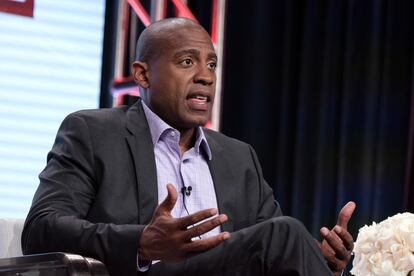Federal authorities arrest Ozy Media founder Carlos Watson
Federal agents arrested Carlos Watson at a Manhattan hotel after two of the company’s top executives pleaded guilty this month to fraud charges

The founder of the troubled digital start-up Ozy Media was arrested Thursday on federal fraud charges as part of what prosecutors say was a scheme to prop up the financially struggling company, which hemorrhaged millions of dollars before it shut down amid revelations of possibly deceptive business practices.
Federal agents arrested Carlos Watson at a Manhattan hotel after two of the company’s top executives pleaded guilty this month to fraud charges, including Ozy’s then-chief operating officer, Samir Rao, who allegedly impersonated a YouTube executive during a pitch to Goldman Sachs, a potential investor.
The indictment unsealed Thursday in U.S. District Court in Brooklyn accuses Watson of conspiring to commit securities fraud and wire fraud, as well as identity theft for his role in the impersonation of several media executives.
Ozy advertised itself as a progressive digital platform for “the New and the Next,” saying on its website that it sought to create a “space for fresh perspectives, introduces you to rising stars and breakthrough trends, and offers new takes on everything from news and culture to technology, business, learning and entertainment.” But it imploded under insurmountable debt, forcing it to rely on high-interest loans and to more aggressively court investors.
In a parallel civil case, the Securities and Exchange Commission also charged Watson and the company with defrauding investors of about $50 million “through repeated misrepresentations concerning the company’s basic financial condition, business relationships, and fundraising efforts.”
The SEC said Rao and Ozy’s former chief of staff, Suzee Han, have “agreed to resolve the charges against them,” as they did separately with U.S. prosecutors.
Rao pleaded guilty in federal court this week, while Han did so last week. The guilty pleas and arrest were first reported by the Wall Street Journal.
“I am deeply disappointed by the events of today,” Watson’s attorney, Lanny Breuer, said after the arrest. “We were engaged, I thought, in a good faith and constructive dialogue with the government. And given the government’s claims of promoting such dialogue in general, I simply do not understand the dramatic decision to arrest Carlos this morning.”
Scrutiny over the company deepened after the New York Times reported in October 2021 that an Ozy official had masqueraded as a YouTube executive in a failing attempt to get Goldman Sachs to infuse money into the struggling enterprise.
Shortly after, Ozy said it was shutting down.
“As alleged, Carlos Watson is a con man whose business strategy was based on outright deceit and fraud,” said Breon Peace, the U.S. Attorney for the Brooklyn-based Eastern District of New York. “He ran Ozy as a criminal organization rather than as a reputable media company.”
Michael J. Driscoll, the assistant director-in-charge of the FBI’s New York field office said Watson “repeatedly attempted to entice both investors and lenders through a series of deliberate deceptions and fabrications.”
Authorities say Watson and his business partners, between 2018 and 2021, attempted to defraud investors and lenders of “tens of millions of dollars through fraudulent misrepresentations and omissions” about the company’s debts and other key financial information.
On multiple occasions, the U.S. attorney’s office said, Watson and his colleagues pretended to be other media executives to cover up earlier misrepresentations.
If convicted, Watson faces at least two years in prison, with a maximum of 37 years, the U.S. attorney’s office said.
The SEC’s civil complaint, also filed in the U.S. District Court in Brooklyn, accuses Watson and the company of violating anti-fraud provisions of federal securities laws.
“We allege that over the course of several years, the defendants raised approximately $50 million from victim investors on the basis of fraudulent documents and repeated misrepresentations, including, at least in one case, falsely impersonating a potential business partner during a meeting with an investment bank,” said Gurbir S. Grewal, the SEC’s director of enforcement.
The agency, whose regulatory responsibilities include protecting investors, accused Ozy officials of “routinely and purposely” presenting potential investors with dubious financial information, including falsely claiming that the company’s revenues were at least twice what they actually were.
In addition, the SEC said, Watson and Rao also sought investments by allegedly telling prospective investors that they were securing money from high-profile companies and investors.
In one case, the SEC and federal prosecutors contend, Watson and Rao launched a ruse that had Rao impersonating a YouTube executive to convince a prospective investor that it was getting licensing revenue from the online video-sharing behemoth.
When the potential investor discovered the alleged ploy, Watson asserted that Rao was suffering from a “mental health crisis,” the SEC said.
Sign up for our weekly newsletter to get more English-language news coverage from EL PAÍS USA Edition
Tu suscripción se está usando en otro dispositivo
¿Quieres añadir otro usuario a tu suscripción?
Si continúas leyendo en este dispositivo, no se podrá leer en el otro.
FlechaTu suscripción se está usando en otro dispositivo y solo puedes acceder a EL PAÍS desde un dispositivo a la vez.
Si quieres compartir tu cuenta, cambia tu suscripción a la modalidad Premium, así podrás añadir otro usuario. Cada uno accederá con su propia cuenta de email, lo que os permitirá personalizar vuestra experiencia en EL PAÍS.
¿Tienes una suscripción de empresa? Accede aquí para contratar más cuentas.
En el caso de no saber quién está usando tu cuenta, te recomendamos cambiar tu contraseña aquí.
Si decides continuar compartiendo tu cuenta, este mensaje se mostrará en tu dispositivo y en el de la otra persona que está usando tu cuenta de forma indefinida, afectando a tu experiencia de lectura. Puedes consultar aquí los términos y condiciones de la suscripción digital.








































